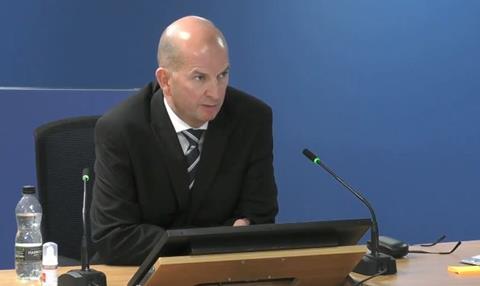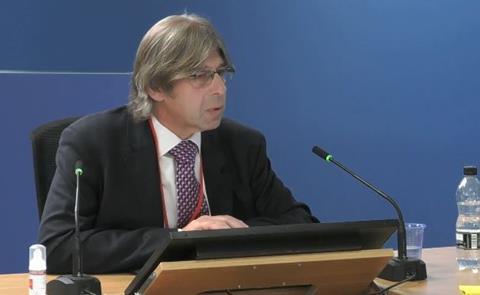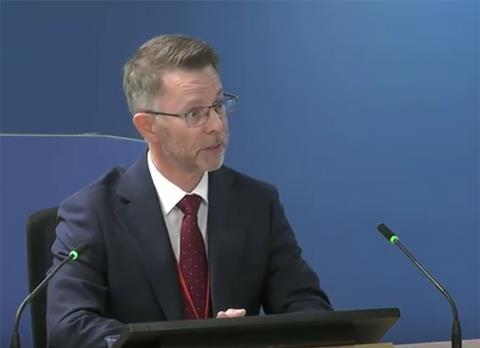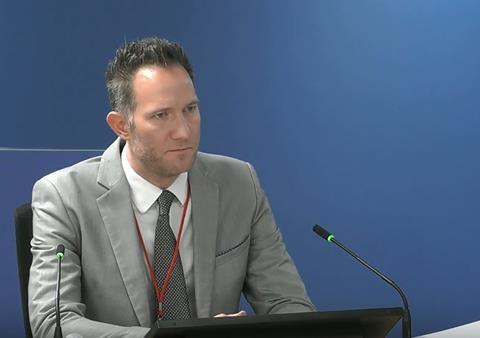Witnesses included consultants from QS Artelia and RBKC’s building control manager
This week saw the Grenfell Inquiry’s barristers wrap up evidence from the consultants who worked on the ill-fated refurbishment and from the local council’s building control department.
Next week they will move on to hear from four members of the TMO team, which was the client on the upgrade that ended with the loss of 72 lives after a catastrophic fire in 2017.
Building control
On Monday the inquiry heard from John Allen, the manager responsible for overseeing the work of building control surveyors at the Royal Borough of Kensington and Chelsea (RBKC).
He denied there was a culture of bullying in his department or that it was overstretched despite the number of building surveyors being “substantially reduced” after a restructure.
John Allen denied there was a culture of bullying in his department or that it was overstretched
These were claims made the previous week by John Hoban, the council inspector who approved the completed refurbishment as worthy of a compliance certificate, and who resigned a few weeks before the fire because of work pressures.
Allen also cast doubt on the number of projects Hoban said he was expected to oversee and which was, he said, affecting his health. Allen said: “Of those 130 there would be a number of those that hadn’t even started so that wasn’t like an inspection workload, and there was a number that hadn’t been inspected for 90 days.”
Allen insisted he had “full confidence” in Hoban despite his not having experience of high-rise residential overcladding projects. He believed Hoban would have considered the tower to be compliant with Building Regulations when he approved the production of the certificate.

But Allen also cautioned that builders and design teams were ultimately responsible for making sure structures complied with Building Regulations.
Allen was also shown an email which was sent to RBKC executive director of planning Graham Stallwood two days after the fire by former council building surveyor Robert Albrow.
Albrow said he wished to offer his “unconditional support to the building control officer concerned” following the fire and alleged that the council’s building control department was “afflicted by a culture of bullying” and that “surveyors’ concerns are not taken seriously when they are raised”.
His email alleged: “I absolutely believe the management team would knowingly falsify and manipulate records to demonstrate there (sic) ends hanging the surveyor out to dry.”
Allen said he recalled the email but disagreed with its “whole essence”.
Albrow acknowledged that he had been subject to a disciplinary process following an accusation of gross misconduct during his time at RBKC.
Artelia as consultant to the client
For the rest of the week the inquiry heard from staff at consultant Artelia which was appointed by the client, Kensington & Chelsea Tenant Management Organisation (TMO), to provide a range of advice and professional services.
First up was Simon Cash, the firm’s project director on Grenfell, who said he was “shocked” by “irregular and improper” communications between the TMO and main contractor Rydon before the latter was formally chosen as preferred bidder.

Cash said a 2014 tip-off to Rydon’s refurbishment director Stephen Blake that the firm was “in pole position” to be selected – before interviews with tender teams had even taken place – suggested the procurement was compromised and “could have voided the whole process”, Cash said.
The inquiry heard there was a meeting between the TMO and Rydon a few hours before the official announcement in which the builder’s willingness to reduce its £9.2m bid in the event of its appointment was established by the client. The TMO needed to shave £800,000 off the bid because all the tenders had come in over its budget. It had chosen to reprocure the works because the original contractor, Leadbitter, was considered too expensive.
Cash said he had felt “strong-armed” by the TMO into producing a report making the case for a new procurement process just weeks after Artelia had argued for Leadbitter’s retention.
“Peter Maddison and I had had a particularly strong conversation about the changes that had to be made,” Cash said of the report.
“He was being very persistent and put a lot of pressure on us to make those changes. I was quite resistant because I felt that it was a true reflection of what had happened on the project.”
Simon Cash was “shocked” by “irregular and improper” communications between the TMO and main contractor
Cash also said he became aware in 2015 that Blake and TMO director of assets and regeneration Peter Maddison had known each other for a long time and were having direct conversations that were leaving Artelia “out of the loop”. But he said he had no concerns that either’s impartiality might be compromised.
The report was described in an email by Artelia’s Robert Powell – employer’s agent for the project – as “political lubrication”. Cash and his colleague Philip Booth rejected this interpretation, with the latter saying Powell “was quite flamboyant with his language sometimes”.
On Wednesday the inquiry was shown a series of emails by Artelia’s Neil Reed, who took over from Booth as employer’s agent at a late stage on the Grenfell project, complaining about Rydon.
Writing to Cash in May 2016 he said he had never “worked with a contractor operating with this level of nonchalance” and warned the completion of the project was “becoming a farce”.
Cash said the email did not cause him concern because it was a complaint about documentation and “process not the quality of their work”.
It came just over a month after Reed had lodged a formal complaint with Rydon’s Blake, expressing “frustrations and concerns about a number of current issues with the project”.
Asking Blake to escalate his complaint, Reed wrote: “Both the client team and consultant team hold a perception that Rydon could and should be doing more in the run-up to completion.”
There were also frictions inside Artelia, with both Reed and Andrew Malcolm complaining about their colleague Paul Burrows’ failure to communicate well with the client about the handover of CDM documents.
Malcolm told him: “I personally want to stop looking daft at client meetings for missing a deadline we (royal-Artelia-we) had 6 months+ to sort out, let alone any regulatory implications that may or may not have repercussions against Artelia….”
Client ruled out hiring £30k design adviser
On Thursday Reed himself took the stand and was asked about the state of the project when he took over. He said it was “in some delay and I would say distressed”.

He described being surprised by the number of inappropriate design queries he received from Claire Williams, project manager at the TMO. He was also surprised by the number of design changes still being asked for by the client.
“There appeared to be significant ongoing change which would be quite unusual in month nine of a construction project,” he said. “That’s going to cause some challenges and issues for the team to manage.”
Inquiry barrister Kate Grange asked if he got the impression Williams was “struggling to deal with design issues cropping up on the project and needed to reach out to you for help”. Reed replied: “Yes I can see that. Yes, possibly.”
The inquiry heard that the TMO had ruled out hiring specialist technical or design advice for which Artelia would have charged around £30,000, preferring to handle the role in-house. Booth said Williams had done this partly to save money.
He was asked by Grange: “Did they expressly say that to you, ‘We don’t want to incur the additional fees’?” Booth replied: “Well, yes, they were very much about, do we need this role, you know, it’s 30 grand or whatever it was.”

Booth and Reed said the decision did not trouble them because the TMO was a large organisation with capable staff.
But a significant portion of Reed’s evidence focused on how he fielded repeated queries about the design from Williams which he described as “scope creep”.
Grange asked if the kind of queries the TMO raised with him were things a client design adviser could have assisted with, to which he said: “Yes.”
Next week Williams and her colleagues will have the chance to answer questions on these and other matters.
The inquiry is due to last around 18 months.











No comments yet